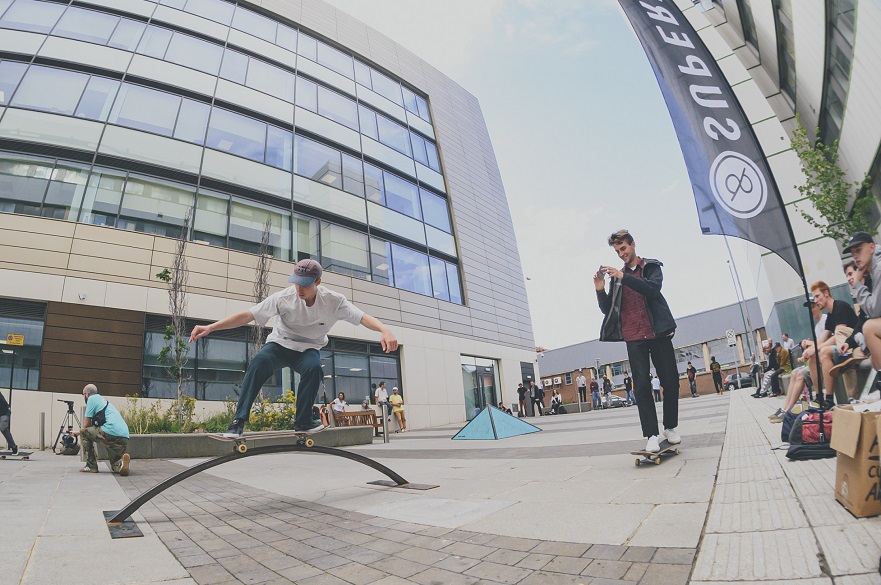Blog: NTU research to help British cities take advantage of Skateboarding’s increased profile following Olympics
Following the Bronze medal success of skateboarder Sky Brown at the Tokyo Olympics, Dr Tom Hughes from the School of Architecture, Design and the Built Environment explains how four NTU undergraduate students have started an exciting research project that will help British cities take advantage of skateboarding’s increased profile to drive recovery and regeneration.
By Helen Breese | Published on 11 August 2021
Categories: Current students; Research;

The world of skateboarding is rich and diverse and has become rooted in our urban fabric through close interactions with other communities (e.g., the arts, music, education), building strong foundations for beneficial urban development. The unsociable stigma policy makers had historically applied to skate culture has begun to fade, with the sport’s Olympic debut giving it new legitimacy.
Some of the implications of the increased participation by women and girls is being explored by a separate, ground-breaking study led by NTU with the Leverhulme Trust.
Later this year, Nottingham will be one of the first British cities (following earlier examples in Glasgow and Sheffield) to open a deliberately ‘skate-friendly’ hybrid public space as part of the Sussex Street development adjacent to the new Nottingham College campus.
This new research project, funded by an NTU Scholarship Programme for Undergraduate Researchers (SPUR) award, explores the challenges, implications and opportunities of the Sussex Street development.
The project is led by Luke Groom, who is going into his third year studying Architecture and is drawn to his subject’s amalgamation of art and science; Brandon Fuller, entering his final year in Economics and interested in how policy makers can maximise social welfare by better understanding the trade-offs between costs and benefits; Nika Maric, who is about to start her third year studying Sport Science and Management and hopes to combine her passion for sport with academic perspectives on how an innovative ‘hybrid’ space might work in real life, and; Thomas Roberts, who is a skateboarder as well as an Economics student, and is interested in how spaces can appeal to the skate community whilst being inclusive to other users.
The project will explore the following questions:
Whether encouraging skaters to take ownership of a space can make other users feel safer, by providing ‘eyes on the street’, or whether there are other specific interventions that can help protect both the skaters and other users.
The practical issues around shared ownership – who manages and controls such a space – and the extent to which this is affected by design and/or policy and management interventions, and
The question of inclusivity and diversity. Can such a ‘skate-space’ enable and encourage greater diversity? To what extent can inclusivity be achieved through policy, design, and management?
Nika, Luke, Thomas and Brandon will investigate these topics through five in-depth case studies: The Israels Plads in Copenhagen; the Place de la République in Paris; the Glasgow Riverside Transport Museum; and the London Southbank Undercroft and Sneinton Market in Nottingham (two informally used or ‘found’ spaces).
They will apply their multi-disciplinary perspectives, evaluating the cases against the emerging plans for Sussex Street developed by Nottingham City Council, Skate Nottingham and Betongpark in collaboration with Pick Everard, Townsend Landscape Architects and Thomas Bow. The skaters’ contributions to the project have been kindly funded by UK Research & Innovation (UKRI) and Habito Mortgages.
The lessons they learn about such innovative hybrid skate-spaces will be shared with the stakeholders in the new Sussex Street development, as well as the wider Greater Broad Marsh Project Advisory Group, and will have wider implications for the development of active, inclusive cities as we recover from COVID-19 and as part of the legacy of Tokyo 2020.
The students are being supervised by Tom Hughes (Senior Lecturer, Architecture), Stuart Jolly (Principal Lecturer, Coaching and Sport Science) and Chris Lawton (NTU Visiting Research Fellow and Community Development Officer, Skateboard GB).
They are sharing their findings, images, artefacts and reflections on an Instagram account dedicated to the project, which you can follow here.